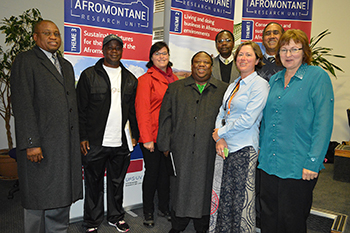
Dr Dipane Hlalele, Assistant Dean in the Faculty of Education on the Qwaqwa Campus; Dr Anofi Ashafa, Dean of the Faculty of Natural and Agricultural Sciences on the Qwaqwa Campus; Prof Corli Witthuhn, Vice-Rector: Research; Prof Sechaba Mahlomaholo, Dean in the Faculty of Education; Dr Geofrey Mukwada, Head of the Department of Geography; Dr Aliza le Roux, Head of the Department of Zoology and Entomology; Prof Prakash Naidoo, Campus Principal and Dr Elsa Crause, Academic Head on the Qwaqwa Campus. |
The Qwaqwa Campus of the University of the Free State in the Eastern Free State boasts of one of the most beautiful and distinctive surroundings that will play a crucial role in fostering research in the under-researched area of the montane communities. This was revealed during the recent launch of the Afromontane Research Unit (ARU), the UFS flagship transdisciplinary research programme.
“This flagship programme has been in the making for about four years as our Qwaqwa Campus is set in a very interesting, unique, and mountainous place. The programme gained the momentum when the National Research Foundation (NRF) challenged each university to come up with their own single niche research area that would give them a unique research identity”, Prof Corli Witthuhn, Vice-Rector: Research, said during the launch.
”The Unit will develop the campus’s research capacity as we have already seen a huge increase in the research outputs by Qwaqwa staff. The campus already has seven scholars in the Vice-Chancellor's Prestige Scholars Programme (PSP), and there is notable excitement here. The Afromontane Research Unit will add to that research excitement as well”, she added.
Prof Witthuhn revealed that an application for the funding of the ARU had already been submitted to the NRF, and a positive response was awaited.
The PSP is an accelerated scholarship of junior UFS researchers in their first five years post-PhD. The prestige scholars participate in an intensive programme of support that includes international placement and intensive mentoring.